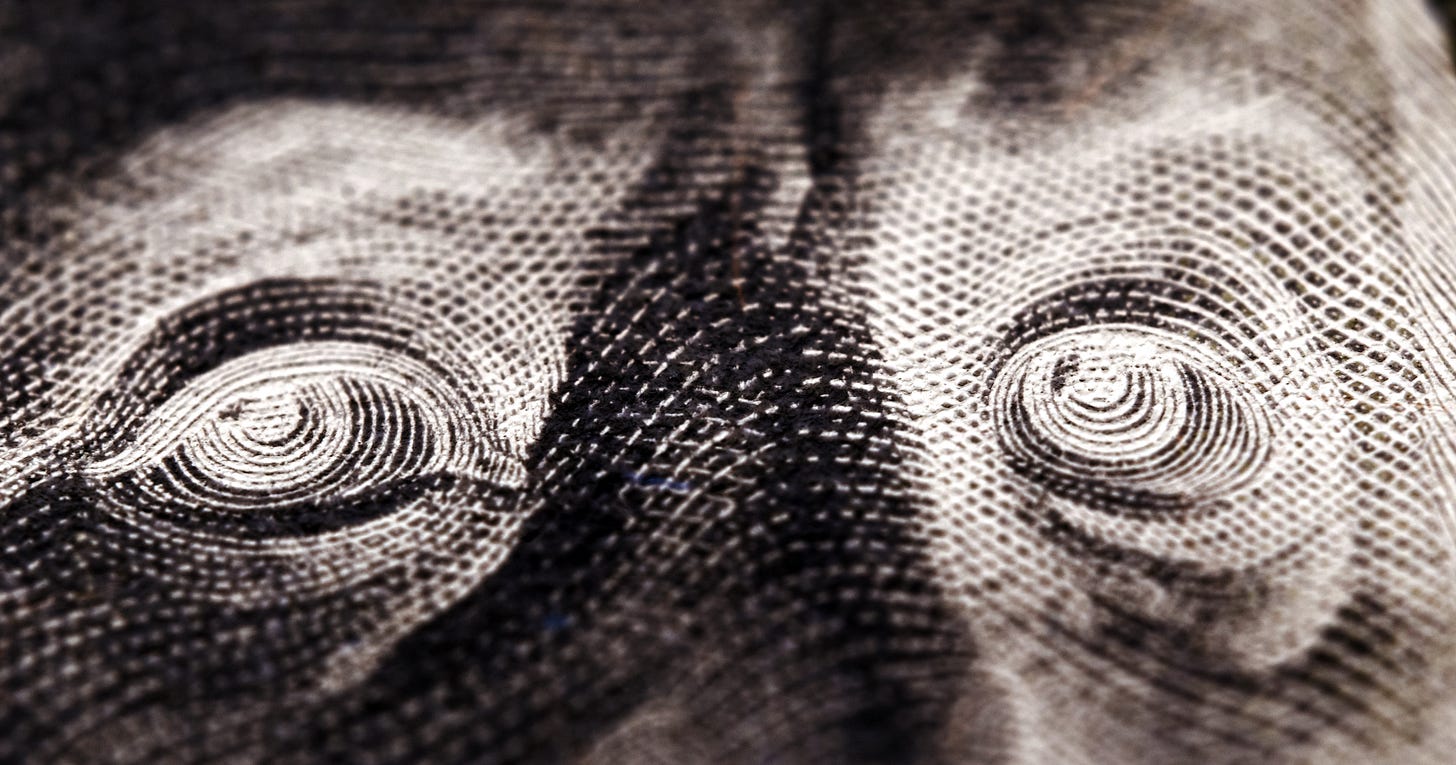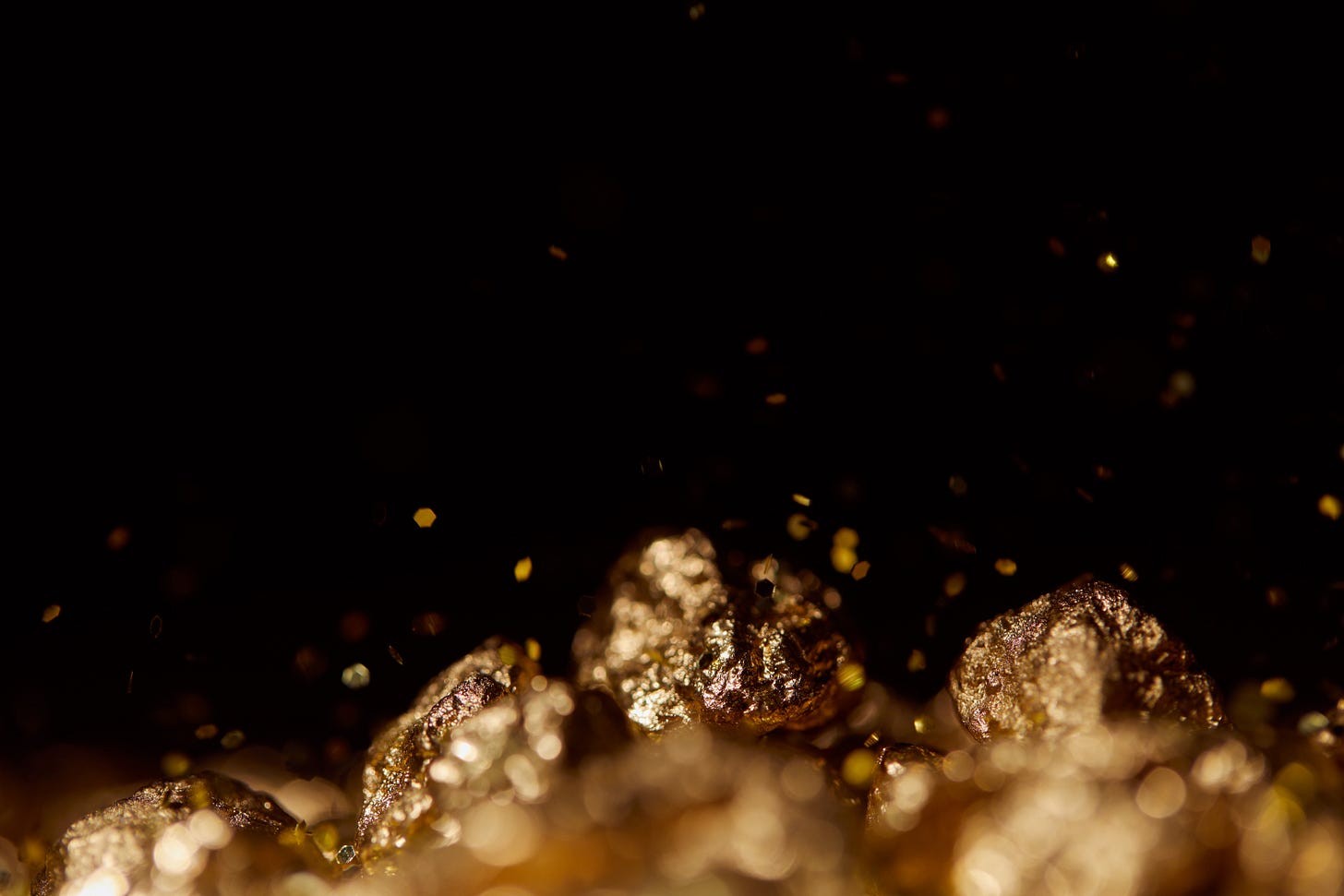
There are two things one immediately needs to know and understand about Money, which exists beyond the definitional interchangeability between the terms Money and Currency in our culture - that being:
Money is the People’s Currency,
&
Currency is the Government’s Money.
And neither the twain shall meet, except when they do.
Every government worldwide would love for their currency to be your money, and for long periods, it is.
Until it isn't.
One of history's most significant and oft-repeated lessons is that Governments can't handle money. When given access to money, they convert it to currency. When given access to currency, they destroy the money.
In our modern times and before, we often interchange the terms between currency and money within our common nomenclature, even to the point of both being interchangeable. They truly are not the same.
Contents
Inflation
Gold Standard
Politics and Power
Roots of Money
The People’s Money
Inflation
My favorite example to highlight the difference between money and currency comes from the ancient Greeks:
A long time ago, there was a People and a Government in a land that may not be that far from you right now. The people traded amongst themselves using gold coinage of different denominations, and the Government collected their claimed share in taxes. Unfortunately, due to the costs of war and crisis, the Government sought more funds, but higher taxes were highly unpopular. So, the Government did what Governments do - they chose inflation, the secret tax.
Since the Government had exclusive access to taxation and minting, they sought to artificially inflate the money supply by melting down the gold coins collected with less valuable metals like copper. Every pound of metal mixed with gold was another pound to spend.
Initially, people didn’t notice the currency had been devalued, as the mix of less precious metals was small to the batches of new coins. This program was so successful that the Government kept it going. As crisis and debts became worse, so did the inflation of coins. Soon, people started to notice the coins looked different as the gold content of the coins gave way to the ugly glare of lies.
People and businesses then started paying their tainted coins as taxes, keeping the best gold coins for themselves. The problem visibly worsened as the Government’s inflated batches of new coins increasingly contained less and less gold. Eventually, the gold coins were not gold at all.
Thus, the People’s Money and the Government’s Currency were born, and neither the twain shall meet - until they do.
Gold Standard
Many people would have us return to the Gold Standard, as it was once in many nations. I’ve always seen this as a failure to understand our collective history. A return to the Gold Standard does not resolve the issue of issuance. A government could place limits upon itself through legislation or Constitutional Provision - which is only as permanent as the will to maintain it and the arguments against it.
This is to say, if a government has a particular amount of gold within storage and they have the power, vested by themselves, to issue currency and debt, which is backed by the deposits, the only thing stopping them from issuing more debt against the deposits is Political Will or War.
It is war that destroys Treasury Fiscal Prudence far more often than vote-buying measures, which usually develop after the public coffers are opened; a Pandora’s box of fiscal irresponsibility that will inevitably lead to further targeted spending among voting groups a Political Party seeks to court to their favor, as it is today.
The argument for a Gold Standard is what I like to call a “Set it and Forget it” policy objective - which supposes that if the Government was merely limited in this one way, we could all go back to forgetting about what the Government does as the Government is now incapable of the thing it was doing which we didn’t like. It’s the same idea of ‘we just need more laws,’ as if laws stop crime instead of eventually making everyone a criminal after enough vague laws are passed—or the opposite argument, reducing prosecutions and enforcement, lowering crime statistics, but never crime itself.
The truth, if one scans across the thousands of years of written history, is that Governments can’t handle money. Whether it’s a Democracy or Monarchy, it doesn’t seem to matter. Though there are a few select examples of Sovereign Wealth Funds among this dynasty or that nation, the fact of the existence of such a fund is not evidence against Government mishandling - rather proof that Political Will and War haven’t yet had their impacts upon populist leaders with access to public accounts.
Fundamentally, the arguments for maintaining a Gold Standard always fall away during a crisis, whether because the public is unaware such standards have been violated or because the public finds themselves in agreement with removing the standard, if only temporarily.
No one gets rich by holding the People’s Money,
&
No one stays rich by holding the Government’s Money.
There are certainly more arguments against the Gold Standard, such as that we monetarily evolved beyond its functional limits, and clipping or shaving of coins to extract value from something fixed only leads to inflation and thievery. A Gold Standard will only reinforce the paper exchange of Government Currency and the belief in its value - until it has none.
Also, isn’t it funny how those who invest so heavily in Gold and Metals always demand the Government do the same, which is a conflict of interest if there ever was one. A comparable would be CEO Zuckerberg lobbying the Government to mandate a 10% minimum purchase of Meta Stock within the Social Security Trust Funds - for the public’s benefit, of course.
Politics and Power
Speaking of conflicts, there is a little secret about money that no one wants you to know, and few will discuss it in depth: The rich are slaves to the values of the poor.
This is why the rich are so heavily invested in controlling your narratives, values, and politics. Tis the only form of control they can exert against us. On the macro-scale, the poor and, in the last century, the middle class truly have the power of value. What you value makes and breaks banks, businesses, empires, religions, and the very elite themselves. Most significantly, what you trade, invest, and covet.
Have you ever wondered why many nations require specialized licensing schemes and academic credentials to allow you the privilege of accessing exotic products and exchanges? They claim these processes exist to protect you from yourself. The truth is closer to protecting themselves from you. A recent example is the Gamestop and AMC r/WallStreetBets scandal, in which average citizens pitted themselves against vulture Hedge Funds, which sought to destroy iconic companies for profit. It is a necessary function within our markets, but not one deserving of exclusivity. It wasn’t until recently that many of these financial products were truly opened to the public, a door that has begun closing in many nations to reinforce laws in existence for many decades.
An example is Australia, which re-enforced its Securities Legislation just a few years ago, causing the closing of various financial positions, products, and exchanges. Another clear example is New York State’s “Bitlicense,” passed in 2015, which sports a regulatory framework so complex that the original framer, a former NY State Financial Services superintendent, left office one month before its passage to start a financial services consultancy firm, precisely four years after appointment. Upon questioning their motives, they responded with a heavy dose of doublespeak that they cannot consult on particulars - which is the entire consultancy business model they proposed to offer.
Money and power lead men astray or, perhaps stated more critically, facilitate the desires and pursuits of those individuals.
Root of Money
A common trope in our society and throughout history is that money is the root of evil. Some even go to such an extreme as to say the root of all evil. This is a falsity.
Money, when accumulated into riches and wealth, can only help better express that which is suppressed by the individual, society, or organization without riches. Where a wealthy nation seeks war, it will make war with riches. Where a wealthy nation seeks charity, it will make or perpetuate circumstances requiring its charity. Where a wealthy nation seeks peace, it will divert all riches from defense until war is inevitable. If a wealthy nation seeks peace but spends mightily on defense, it will be drawn to war out of necessity or moral argument.
There is no direct connection between money and the inspiration to commit evil. Throughout history, most acts that could be considered evil were perpetuated and enforced by those who didn't and wouldn't consider themselves as such. Whether those individuals are police, government, writers, journalists, or otherwise - it is the inspiration towards 'better,' which is commonly characterized amongst their goals and actions. Therefore, those persons who commit evil with full knowledge and intention rarely commit those acts in the pursuit of greater riches but almost always in the pursuit of interpersonal or societal influence and power. Money to those individuals can be used to achieve the aims but is usually accumulated as a side effect of that achievement.
To see further, check out the Evil Prevails Series within this publication, specifically the article Evil Prevails: Quantifying Malevalence.
Thus, the question becomes, if money isn’t the root of evil, then what is the root of money? Money is the antithesis of violence. The root of money is anti-violence in any group or society that has grown beyond a communal size. A social institution of distribution, if you will.
There are people in this world, historically and presently, and even with attempts at abatement into the future, who would have us revert to more animalistic behaviors and activities. The reason for this is simple - to justify treating us as animals, we must show them that we are animals to provide them with continuing and enhancing justification.
Once we start acting like animals, they flash this as proof as if it were a self-fulfilling prophecy, which grants them moral justification to cull us into kennels (or pods as the current narrative has framed it). The most civilized societies tend towards the hardest to convert - they are just too damn polite and civilized. Less civilized societies are far easier to bend and break as they are much closer to traditional methods and means. The more civilized a society, the more difficult it is to induce unrest.
Looking deeper, there have been many successful mechanisms used to induce civil unrest across history for various purposes, such as:
Mass Immigration or Migration
Developed and Developing cultures naturally clash when housed together, leading to blights such as community isolation, inter-cultural conflicts, repeals of traditional practices, and shifting of national identities and customs, among other issues.
Developing cultures within a developed culture are encouraged towards stagnation in order to perpetuate differences between the groups.
See Further - Black American northern migration (1870-1910 + 1914-1970) following the American Civil War (1861-1865)
Decreased or Ineffectual Policing
Leading to Less Enforcement and Reporting
If a crime isn’t reported, charged, or convicted - it didn’t happen from the statistical perspective.
Criminalization of Protected or Required Human Activities
Self-Defense, Enterprise, Private Gardens, Collecting Rainwater, etc
Denial of Legal and Political Redress
Terrorism
Within, perhaps the most egregious of attempts at pursuing aims against the People’s interests is the weaponization of Money against the very people whose value that Money derives from. Money is one of the social inventions humans created and evolved to handle the distribution of skill, labor, and reward. Commonly misconstrued as a government control mechanism, Money is quite an ingenious human social technology.
The People’s Money
Throughout history, many forms have replaced this common currency among men—everything from salt and spices to polished rocks, including Gold and Silver. Each of these forms of Money had strengths and notable weaknesses.
Look no further than Gold today - up 400% at the time of writing over 20 years, yet still below the 6x unofficial inflation over the same period. Wild speculation and conspiracy abound about price suppression of this asset from Governments and Banks, which is not unfounded. (See Further - The 2012 Libor Scandal, among others)
Our modern world is built almost entirely upon deceit and false faith in expertise, propagated by the lies we tell ourselves. A world where Banks pledge your deposits as collateral, and Brokers trade I-owe-yous for the stocks they claim to hold on your behalf.
In reality, it doesn't matter what is declared a currency or what value that currency supposes for itself. It is the people in every nation who decide what is worthless and what is worthwhile. Which causes me to wonder who invented the trope 'The Rich and Powerful' and if they understood what they were saying when they said it. The most terrifying truth is - it is you who is truly powerful. A power that many in this world are terrified for you to discover.
Consider hyper-inflationary economies in the modern age, where circumstances become so dire the people there would grab onto any value proposition and utilize it for trade. My favorite example is the Long-Distance Calling Cards. An unused calling card had a fixed number of minutes; those minutes have value, and time is Money. Thus, a medium for trade is born.
A society is a delicate balance, the scales of which can be tipped with only a few dedicated individuals pursuing aims with righteous focus. Hence, the churches are pacified, organizations are infiltrated, and everyone is just corrupt enough to be equally guilty. It's the rare glimmer when a voice speaks truth to power, like a flower blooming. If you observe, you can see the moment when they are uprooted and replanted within a climate-controlled greenhouse to bloom behind glass, far away from you or me.
I often wonder what would happen if people understood the power they honestly had. Recent political boycotts aside. Equally, I wonder if it's even moral to tell them. Not that you, specifically, would seek its power, but rather, the faceless mob filled with momentary angst can be quite the destructive force; or perhaps more grave, those who seek to wield that power towards alternative ends.
It's all delicate scales, you see. That's why we call our leaders 'Honorable' as if calling them such might imbue a sense of the title offered within their actions and stances instead of the more common and predictable result.
The most powerful thing in this world is Money. Not because Money itself has any power but because it derives the power you possess from you and your value system. Therefore, the most powerful thing in the world is Money because you, who created and valued it, allow it to be a representative extension of your power.
It's what the rich crave.
What the poor lack.
What Governments subsist on.
One day, the government will declare war on the value proposition itself. They will eventually lose that war because fundamentally - you are the value, the value of Money lends itself from you, and they have neither one of those for themselves.
Remember, when seeking truth in a modern world built on lies-
Never Trust, Always Verify: all others pay cash.
As always,
Farewell, and Good Luck.
-Dark Philosopher
Article Updates
Dec 31/23 - Replaced Video: Rendering Issues













